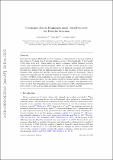| dc.contributor.author | Agrawal, Raj | |
| dc.contributor.author | Roy, Uma | |
| dc.contributor.author | Uhler, Caroline | |
| dc.date.accessioned | 2022-07-21T13:17:57Z | |
| dc.date.available | 2022-07-21T13:17:57Z | |
| dc.date.issued | 2020 | |
| dc.identifier.uri | https://hdl.handle.net/1721.1/143912 | |
| dc.description.abstract | <jats:title>Abstract</jats:title>
<jats:p>Selecting the optimal Markowitz portfolio depends on estimating the covariance matrix of the returns of N assets from T periods of historical data. Problematically, N is typically of the same order as T, which makes the sample covariance matrix estimator perform poorly, both empirically and theoretically. While various other general-purpose covariance matrix estimators have been introduced in the financial economics and statistics literature for dealing with the high dimensionality of this problem, we here propose an estimator that exploits the fact that assets are typically positively dependent. This is achieved by imposing that the joint distribution of returns be multivariate totally positive of order 2 (MTP2). This constraint on the covariance matrix not only enforces positive dependence among the assets but also regularizes the covariance matrix, leading to desirable statistical properties such as sparsity. Based on stock market data spanning 30 years, we show that estimating the covariance matrix under MTP2 outperforms previous state-of-the-art methods including shrinkage estimators and factor models.</jats:p> | en_US |
| dc.language.iso | en | |
| dc.publisher | Oxford University Press (OUP) | en_US |
| dc.relation.isversionof | 10.1093/JJFINEC/NBAA018 | en_US |
| dc.rights | Creative Commons Attribution-Noncommercial-Share Alike | en_US |
| dc.rights.uri | http://creativecommons.org/licenses/by-nc-sa/4.0/ | en_US |
| dc.source | arXiv | en_US |
| dc.title | Covariance Matrix Estimation under Total Positivity for Portfolio Selection | en_US |
| dc.type | Article | en_US |
| dc.identifier.citation | Agrawal, Raj, Roy, Uma and Uhler, Caroline. 2020. "Covariance Matrix Estimation under Total Positivity for Portfolio Selection." Journal of Financial Econometrics, 20 (2). | |
| dc.contributor.department | Massachusetts Institute of Technology. Computer Science and Artificial Intelligence Laboratory | |
| dc.contributor.department | Massachusetts Institute of Technology. Laboratory for Information and Decision Systems | |
| dc.contributor.department | Massachusetts Institute of Technology. Institute for Data, Systems, and Society | |
| dc.relation.journal | Journal of Financial Econometrics | en_US |
| dc.eprint.version | Author's final manuscript | en_US |
| dc.type.uri | http://purl.org/eprint/type/JournalArticle | en_US |
| eprint.status | http://purl.org/eprint/status/PeerReviewed | en_US |
| dc.date.updated | 2022-07-21T13:08:53Z | |
| dspace.orderedauthors | Agrawal, R; Roy, U; Uhler, C | en_US |
| dspace.date.submission | 2022-07-21T13:08:54Z | |
| mit.journal.volume | 20 | en_US |
| mit.journal.issue | 2 | en_US |
| mit.license | OPEN_ACCESS_POLICY | |
| mit.metadata.status | Authority Work and Publication Information Needed | en_US |
